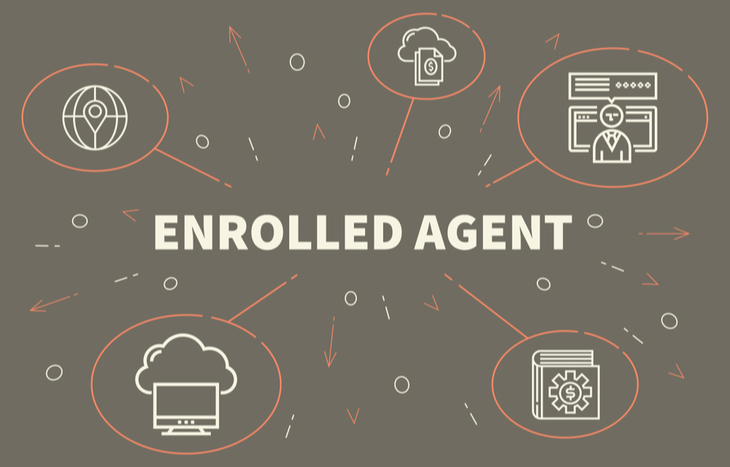What is an Enrolled Agent?
Many CPAs and tax professionals double as Enrolled Agents and offer representation in front of the IRS. This is an important designation to look for, and a helpful one in the right situation. An Enrolled Agent is a tax professional authorized and licensed by the U.S. government to represent taxpayers in matters against the Internal Revenue Service (IRS). If you’re facing an audit or tax penalties, it pays to have an Enrolled Agent on your side.
Not every CPA is an Enrolled Agent. Those seeking to become Enrolled Agents need to apply with the IRS and engage in continuing education each year to stay abreast of the changing tax code. Moreover, they must adhere to a code of conduct set down by the National Association of Enrolled Agents (NAEA).
If you’re thinking about becoming an Enrolled Agent or need to enlist the services of one, read on to learn more about who they are and what they do.

An Interesting History of Enrolled Agents
Enrolled Agents have existed since the Civil War. In 1884, President Chester A. Arthur signed the Horse Act in response to fraudulent claims filed for losses incurred during the Civil War. The legislation established Enrolled Agents: individuals tasked with mediating the claims of citizens and the response of the Treasury Department.
It wasn’t until the passage of the 16th Amendment in 1913 that Enrolled Agents became more aligned with tax representation. Then, in 1972, the NAEA formed as a professional standards organization. Today, the NAEA sets the ethical code of conduct for Enrolled Agents and the Treasury Department recognizes their status.
How to Become an Enrolled Agent
There are several ways to become an Enrolled Agent. Every person seeking the designation will need to follow a few key steps:
- Obtain a Preparer Tax Identification Number (PTIN)
- Pass the IRS Special Enrollment Exam
- Apply for Enrollment to Practice Before the Internal Revenue Service
- Pass a suitability check to ensure you have no outstanding tax liabilities
Most CPAs and attorneys have a direct path to Enrolled Agent status—they can bypass the examination entirely. Moreover, those with five years of individual tax preparation experience can also forgo the examination.
After becoming an Enrolled Agent, practitioners need to complete 72 hours of continuing education every 36 months. This ensures they stay knowledgeable about the tax code and any changes in interpretation or process. Those who do not complete continuing education will see their Enrolled Agent status lapse.
Important Notes About Enrolled Agents
- Agents are not IRS employees and cannot infer an employee relationship with the IRS
- Enrolled Agents have unlimited practice rights; agency carries over to any state
- Agents are not “certified” and can’t display their credentials when representing clients
Services
While Enrolled Agent status focuses primarily on representation before the IRS, it often opens the door to other tax services. Most Enrolled Agents offer several services, as a way to ease the complexities of staying compliant with the IRS. For example, common services offered by Enrolled Agents include:
- Tax planning. Enrolled Agents can help clients plan ahead to lower their tax burden and reduce the chances of tax liabilities. This also includes planning for taxable events.
- Tax preparation. This service focuses on the preparation and audit of personal or business tax returns, to ensure accuracy and compliance with IRS standards.
- Tax representation. In the event of an audit or tax penalty, Enrolled Agents represent the best interests of their client to seek an amicable, favorable resolution.
Many Enrolled Agents are also CPAs, attorneys or financial advisors. This allows them to offer specific advice in these areas of practice, as a means to help clients navigate complexities within the tax code.
The Benefits of Working With an Enrolled Agent
Individuals and businesses alike are wise to work with Enrolled Agents any time there’s a dispute with the IRS. Not only are they knowledgeable about the tax code, they’re also well-trained in IRS processes and procedures. This gives Enrolled Agents and their clients insight into what to expect and how to handle certain situations, such as audits or notices.
Moreover, Enrolled Agents can often help prevent unfavorable tax situations from arising altogether. Through tax planning and tax preparation services—as well as peripheral specialties—these individuals bring foresight to any tax situation. In fact, if they’re an NAEA member, they must complete 90 hours of continuing education every 36 months—more than the IRS agent requirement.
Perhaps the most important aspect of working with an Enrolled Agent is getting the peace of mind that comes with a true tax professional. The IRS requires Enrolled Agents to prove their proficiency in every aspect of taxes, ethics and representation—something not required of CPAs or financial advisors.
When to Work With an Enrolled Agent
Individuals and businesses need to seek the services of an Enrolled Agent any time they’re faced with a tax dispute or subject to audit or inquiry from the IRS. Enrolled Agents become a powerful and effective liaison for their clients, and can save them countless hours and dollars in back-and-forth communication. More importantly, they can resolve issues of miscommunication or misunderstanding before they escalate.
Thanks to their intricate knowledge of the tax code and ability to contextualize tax-related problems, Enrolled Agents are an asset to clients facing scrutiny from the IRS. In addition, with background knowledge as a CPA, attorney or financial advisor, they’re likely well-equipped to help prevent future tax issues from arising.
To learn more about Enrolled Agents and other financial professionals, sign up for the Investment U e-letter below. You can advance your investment and financial knowledge with our daily newsletter!





